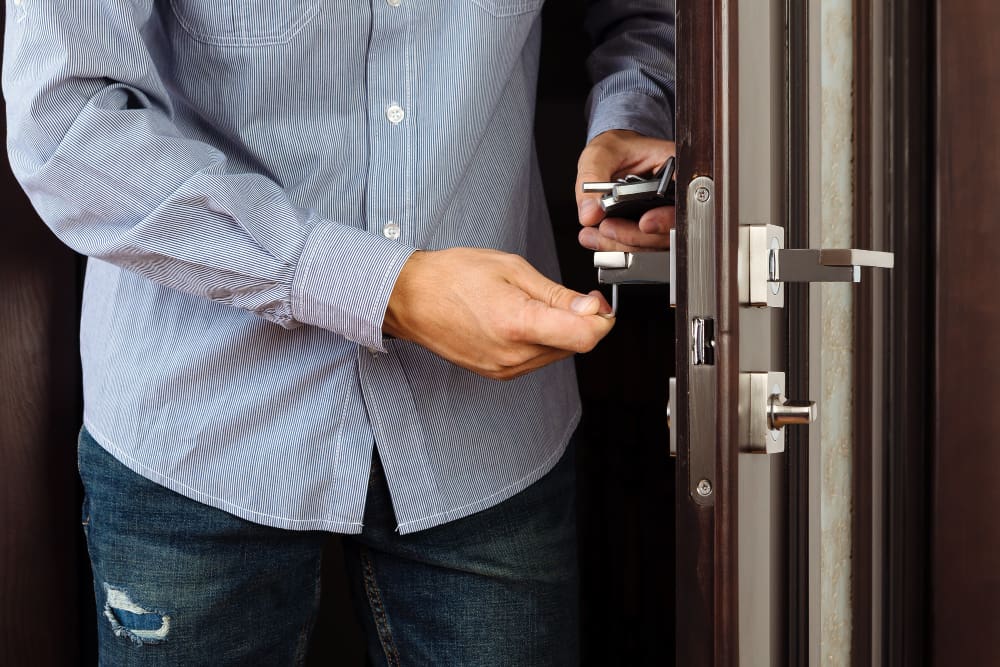It’s a tense moment: you arrive home after work, only to find a new lock on the door. Landlords sometimes change locks, but when is it legal? When do you have rights to access your rented space?
This guide walks you through landlord rights, your tenant protections, acceptable reasons for lock changes, and what to do if you’re locked out unfairly.
Whether you’re a first-time renter or just curious, this article sheds light on a pivotal aspect of tenancy: locks.
Quick Summary
This extensive article examines tenant rights and landlord authority when it comes to changing locks. It starts with what landlords can legally do – from securing vacant units to responding to emergencies – and explains that these powers come with rules and notice requirements.
Tenants have rights too: to peaceful possession, timely access, and notice before lock changes. The guide explains reasons landlords may change locks – ranging from safety concerns to eviction – and outlines how and when notice is legally required. It clarifies emergency rules, deposit implications, and lock change procedures including locksmith use.
You’ll understand your options if locked out, how to resolve disputes through communication or legal means, and where to find state-specific laws. Giving insight into fair practices, landlord responsibilities, and tenant protections, this article ensures you’re equipped to handle lock changes confidently and protect your rights.
Legal Rights of Landlords
Landlords hold authority over their property, but that authority comes with limits – especially when it affects your entry to a rental unit. Here’s what landlords are generally allowed to do:
Ownership Responsibilities
As a property owner, a landlord may change locks to maintain property security, prevent unauthorized entry, or when units are vacant. It’s part of keeping rental properties safe for tenants.
Enforcing Lease Terms
If a tenant violates lease terms – say they keep unauthorized pets, fail to pay rent, or damage property – the landlord may legally initiate eviction and eventually secure the unit by changing locks, but only after following proper procedures.
Protecting Future Tenants
When tenants move out, landlords often change locks to prevent former tenants or others from accessing the unit. This is a common, reasonable step to keep upcoming residents safe.
Tenant Rights Regarding Lock Changes
Right to Peaceful Possession
Tenants have the right to occupy and enjoy the rented space without interference. Lock changes without notice or a valid reason may violate that right.
Legal Right to Access
Unless locked out for legal reasons (like eviction), tenants cannot be denied access. Altering locks without providing replacements or ignoring access requests may breach local tenant protection laws.
Right to Notification
In many regions, landlords must notify tenants before changing locks – often 24 to 48 hours in advance – unless it’s an emergency. Failure to provide this notice can be illegal.
Right to Challenge Changes
If a landlord changes locks without legal cause or proper notice, tenants often can challenge the action in housing court, and may be eligible for damages or legal costs.
Reasons Landlords May Change Locks
Move-Out or Tenant Turnover
Between renters, landlords commonly reset locks to secure the unit for the next occupant.
Lost Keys or Security Threats
If a tenant loses keys or there’s a suspected break-in, landlords may change locks to protect everyone’s safety.
Lease Violations
Repeated damage, unapproved occupants, or unpaid rent might justify changing locks – provided legal notices and proper eviction are in place first.
Emergency Situations
Emergencies such as flooding, electrical fire hazards, or structural damage may require immediate lock changes to control access and ensure safety.
Notice Requirements for Tenants
Advance Notice Rules
In most jurisdictions, landlords must give advance written notice before lock changes. The required time frame ranges from 24 hours to several days, and it may be specified in your lease or state law.
Skip Notice in Emergencies
Emergencies justify immediate lock changes, but tenants must still receive notification as soon as possible afterward. Landlords should act responsibly and document reasons for urgency.
Form and Delivery of Notices
Notices are typically written – via email, text, or certified letter – and need to describe the reason, timing, and new access method. Oral notices might not meet legal standards.
Emergency Situations and Lock Changes
What Qualifies as Emergency?
Emergencies include fire, gas leaks, floods, or violent entry. In these cases, landlords must act fast to secure the property.
Landlord Obligations
After securing locks, landlords should notify tenants, restore access, and repair hazards. Keeping tenants informed and safe is top priority.
Balancing Safety and Tenant Rights
Even during emergencies, tenants must regain access promptly once the threat is resolved. Lock changes shouldn’t become a form of informal eviction.
Security Deposits and Lock Changes
Can Landlords Charge for Locks?
Yes. If locks are changed for non-emergency reasons – like move-out or lost keys – the cost may be deducted from your security deposit, if lease terms allow.
Handling Emergency Costs
If locks are changed to protect tenants or due to landlord negligence, charging the tenant could be unfair. Documentation and transparency are key.
Deposit Return Guidelines
If a lock change happens before you move out, landlords must provide you access. Charging fees that exceed actual costs could violate deposit-return laws.
Procedures for Landlords Changing Locks
Best Practice Guidelines
Landlords should:
-
Provide written notice with date, reason, and method of re-entry
-
Use high-quality locks
-
Supply copies of new keys promptly
-
Keep detailed records of notices and lock changes
Rental Agreement Language
Most leases outline lock-change procedures – reasons allowed, notice required, and how keys are redistributed. Review your lease during move-in.
Professional Locksmith Use
If a locksmith is required, landlords should hire licensed professionals, keep invoices, and ensure new locks function properly.
Tenant Access After Lock Changes
Receiving Replacement Keys
Replacing locks means tenants should get new keys right away – often at the time of change or shortly after. This restores secure access.
Access Delays
If locksmith scheduling or other delays occur, landlords must act quickly and communicate timelines. Extended delays may violate tenant rights.
What to Do If You’re Locked Out
In case of lockout, contact your landlord immediately. If access isn’t restored within reasonable time, document calls and consider contacting tenant advocacy services or legal help.
Resolving Disputes Over Lock Changes
Open Communication First
Often, explaining the situation and negotiating written access arrangement resolves problems without escalation.
Tenant Advocacy Organisations
Many cities offer tenant protection offices or nonprofits that mediate landlord-tenant conflicts and explain tenant rights.
Legal Actions and Consequences
If unlawful lock changes occur, tenants may:
-
File actions in housing court
-
Seek injunctions, damages, or restitution
-
Report landlord to local housing boards
Documenting notices, lock changes, access issues, and expenses builds a strong case.
State-Specific Laws on Lock Changes
Overview of Variations
Lock-change laws differ across the US. Some states require 24-hour notice; others may demand 48 hours. Certain cities have tighter protections.
Sample Legal Differences
-
In California, landlords must allow tenant presence at lock change and provide written notice.
-
In New York City, lock change without a 10-day written notice can be considered illegal eviction.
-
Texas allows immediate lock changes only after a court-ordered eviction or for non-payment, with proper notice.
Where to Look for Your Laws
Your state or municipal housing code or lawyer general’s office website lists specific rules. Local tenant rights groups also provide summaries.












